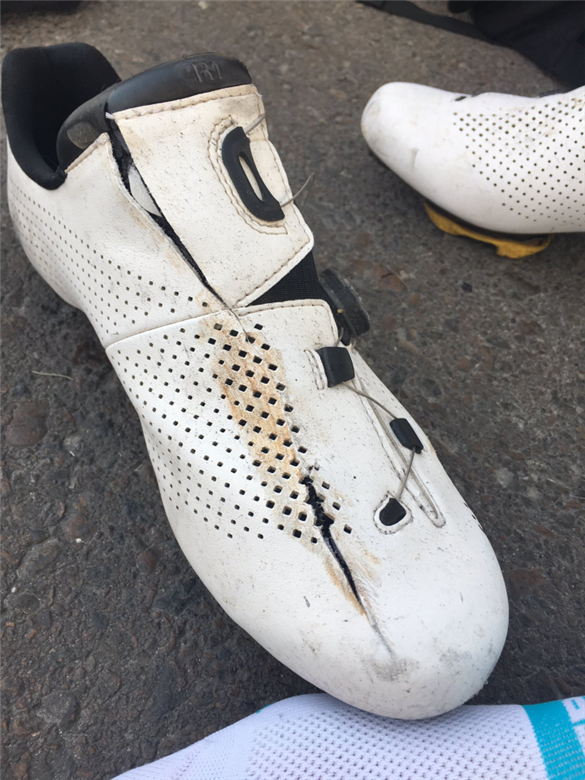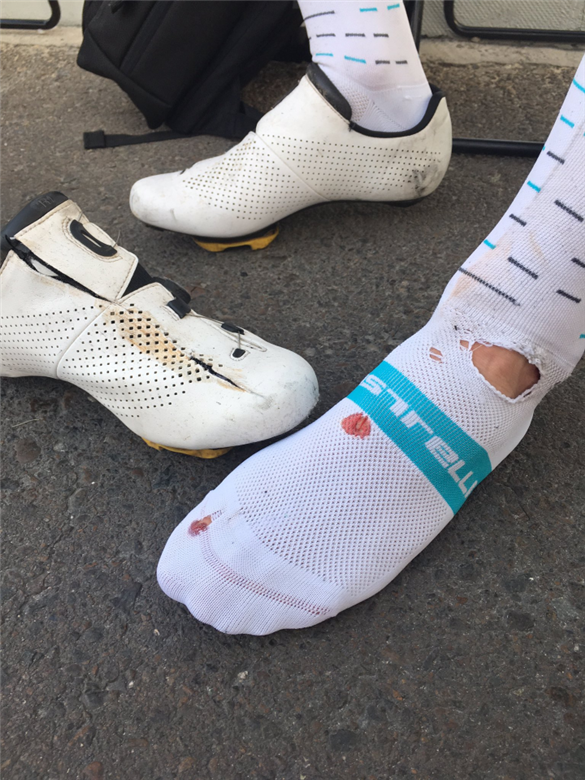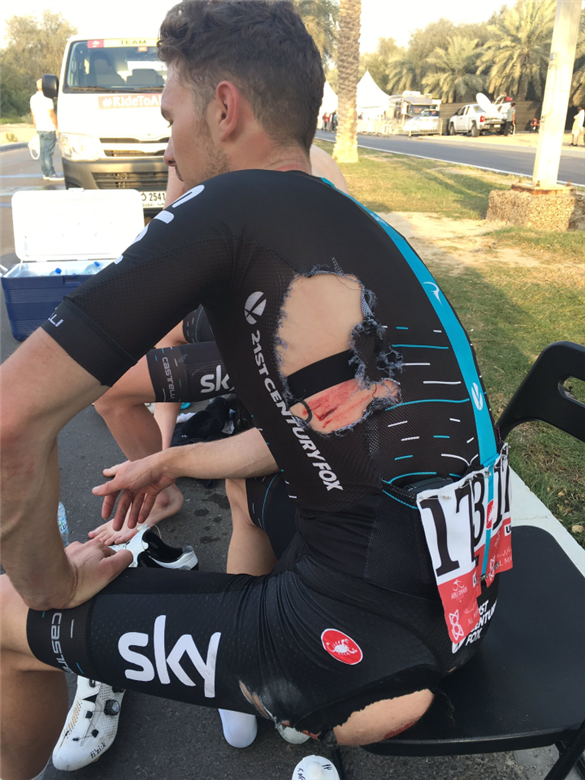Pro Peloton acts on Disc Brake Safety Fears
Professional Cyclists Association calls for more safety tests on disc brakes
Fears that disc brakes could cause serious injuries has prompted the CPA to call for further tests before they are allowed to be trialled in any more professional races.
In a statement, the CPA, which represents the main tour team riders, said it was concerned that safety features, such as fitting them with protective covers, had not been implemented.
There are issues with discs getting very hot and the CPA are suggesting full disc covers to provide the best safety measures possible. Their other concern is centered around races whereby some riders are using discs and some aren't, so the CPA suggested a full-peloton disc brake trial.
“The CPA has sent a legal warning to the UCI to inform it that the CPA is very concerned about the situation that has arisen since the authorization to use the disc brakes during the races,” the statement said.
“The trial has started before appropriate tests were conducted on the risks to which the riders are exposed in the event of accidental contact with the discs (for example during a group fall).”
CPA president Gianni Bugno said repeated calls to safeguard riders had come to nothing.
“Now we feel compelled to act in a stronger way to be heard,” he said. “As we have always said we are not against the disc brakes but against the non-implementation of the security measures that the majority of the riders asked for.”
Team Sky’s rider Owain Doull said he his left shoe was sliced by Marcel Kittel's disc brakes during last week’s Abu Dhabi Tour. Kittel was trialling the discs, but later returned to rim brakes.
“My shoes cut the pieces, that’s definitely brakes that did that,” Doull said. “It’s gone straight through my shoe into my foot. That’s lucky it is not my leg. If that had been my leg it would have cut straight through it.”
“Unless there are covers on then you should not use them.”



The World Federation of the Sporting Goods Industry (WFSGI) issued a statement on Tuesday disputing whether disc brakes caused Doull’s injury, saying it was likely to have been caused by coming into contact with crash barriers.
Time Line
Disc Brakes were introduced into the Pro Peloton at the end of the 2015 season, with full trials starting in 2016.
The UCI banned the use of disc brakes last April 2016, following Movistar rider Francisco Ventoso’s crash in this year’s Paris-Roubaix Classic, wherein the Spanish rider claimed he was severely cut by a disc brake rotor.
In the aftermath, both the French and Spanish cycling federations banned the use of disc brakes in mass cycling events, such as Gran Fondos and Sportives. Disc Brakes were not banned from Canadian Amateur Events - but not Recommended .The Ontario Cycling Association stated "We will continue to review the events that we sanction to further ensure that we are compliant with the rules. At the club level we are following the lead of Cycling Canada and do not recommend disc brakes in any circumstance where riders will be in a group or a bunch"
However, in September 2016 the UCI Gave the Go Ahead For Disc Brakes To Be Used In Mass Cycling Events, like Gran Fondo's, Sportives and Gravel Fondo's. While neither the French Cycling Federation (FFC) or the Spanish Cycling federation (RFEC) officially responded to the UCI’s declaration, there were postings on their respective social media sites, indicating that disc brakes were again being allowed for all amatuer mass start cycilng events.
To re-iterate, Disc brakes are currently allowed in amateur, mass participation cycling events, like Gran Fondo's, Gravel Grinders and Sportives.
In October 2016, the UCI restarted the disc brake trial in the the Pro Peleton, this time with dulled, rounded disc rotors. The UCI believed that the rounded edges required for the next trial would remove the risk injury and lessen the problems with wheel changes. A formal trial and review process, with approval from the Pro ranks.
Late October 2016, Francisco Ventoso accepted the return of disc brakes to Pro races stating "They modified the brakes, they studied the problems and guaranteed the safety for the riders. The UCI and CPA said that with these modifications that the manufacturers made make them safer. Let’s see. I put my faith in them. I’ll use what the team gives me"
In January 2017, Boonen won the 2nd Stage at the 2017 San Juan. The win, the first ever of a rider on a bike equipped with disc brakes.
Then on Stage 1 of the Tour of Oman, Owain Doull's stated that the he thought his shoe had been sliced by Kittel's Disc Brakes in a bad crash with 1 km to go. Kittel was trialling them too. However video footage surfaced after the stage, seemed to point that Owain Doull and Marcel Kittel didn't come into contact when they crashed with suggestions indicating Owain Doull's shoe hit a barrier post.
Marcel Kittel decided not to use discs for the remainder of the race. “I will not use my disc brake bike today out of respect for my colleagues because I understand the safety issues,” Kittel said. “I wanted to hear how he is and what he thinks about what happened yesterday. We also spoke about his opinion and his sliced shoe, how it maybe happened.”
“I think in the end nobody can really tell (what happened). I can understand that directly after a race, when you crash and are emotional, the easiest thing to do was to blame disc brakes. Afterwards on social media there was also good and strong evidence that it was maybe not the case. But it’s not up to me to decide. The UCI has said that this a period for testing disc brakes. They also have to take all the proof that is there, and decide what the real reason was. I think that’s an important thing to do. We should not lose each other in discussions about safety.”
In February 2017, the Professional Cycling Association (CPA) which looks after the interests of professional riders in the Pro Peloton voted to demand that the UCI withdraw disc brakes. The Professional Cycling Association want a ban until a full trial has taken place. The CPS felt that riders concerned aren't being addressed.There are issues with discs getting very hot and the CPA are suggesting full disc covers to provide the best safety measures possible. Their other concern is centered around races whereby some riders are using discs and some aren't, so the CPA suggest a full-peloton disc brake trial form a logistical point of view.
End of February 2017, the Professional Cycling Association (CPA) sends a legal warning to the UCI inform it that the CPA is very concerned about the situation that has arisen since the authorization to use the disc brakes during the races
Whilst this has been taking place several riders have voiced their opinions for and against disc brakes:
Against
Chris Froome and Nairo Quintana have openly voiced their concerns about the safety aspects and introduction of discs in the pro peloton. A larger porportion of the Pro Peloton polled by the CPA, had major concerns' with the testing and safety aspects of Disc Brakes.
For
Tom Boonen and Marcel Kittel have both trialled disc brakes. Tom Boonen said recently “I maintain that they are not dangerous. I’ve dared to stop a wheel at 60 kilometres an hour with my hand”, responded Boonen. It’s absurd. Disc brakes seem at the moment to be the biggest problem in the world.”
Het Nieuwsblad newspaper put Boonen’s theory to the test. A video showed Veranda’s Willems Crelan team mechanic, Tim Dejonghe, stopping the wheel at full speed with no injury to his hand. However his hand is flat on the top surface and not at an angle moving at speed towards the disc, which could potentially cause injury.
Pinarello made a disc brake version of its Dogma F8 and Fausto Pinarello is fascinated by cycling technology, but he still has to be convinced by the need for disc brakes. "The big brands want to push people towards disc brakes because that way there are fewer bikes design options out there and so they can dominate the market even more. If everyone is on disc brakes, then it's easier for them."
The controversy with disc brakes continues ...



 250 km
250 km






